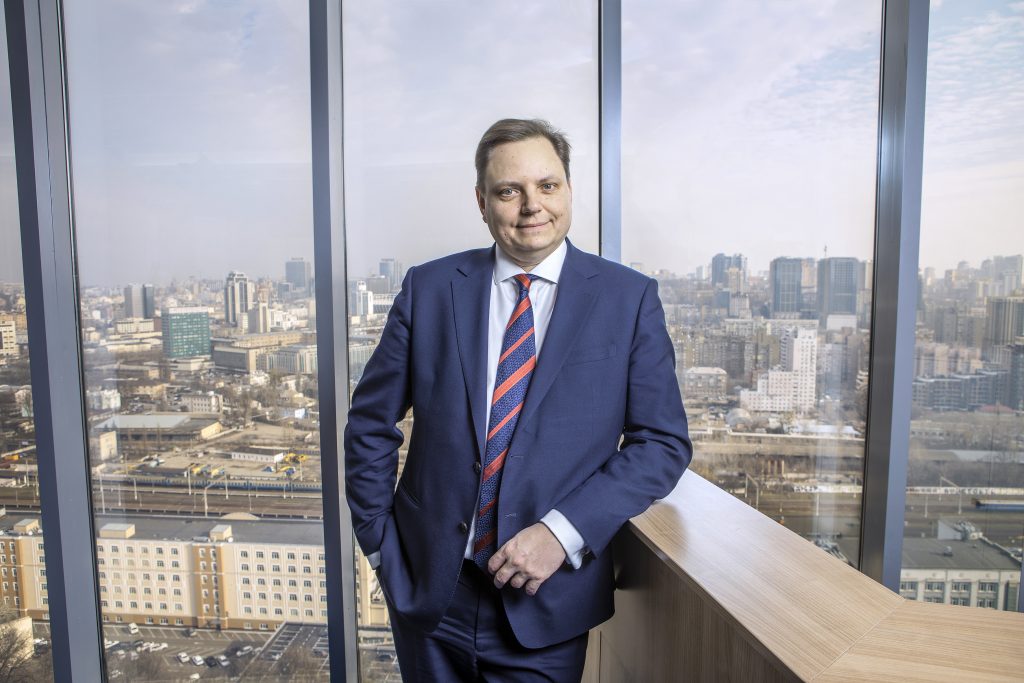Andriy Hunder, President of the American Chamber of Commerce in Ukraine

Imagine that the quarantine will end soon. How do you think companies will return to “average pace of life”?
The difference between Ukraine and European countries is that the latter are already returning to work. Why? Because the vaccination there is carried out much more dynamic than here. It seems that our return to average pace of life will take place after other countries. On the one hand, it is good because we can get experience from them and learn from their mistakes. The only question is how much longer we will stay home in slippers, and how soon we will change them into shoes and start wearing ties to the office. Many people missed personal communication, but there are some who got accustomed to the new conditions, as evidenced by performance levels. When the pandemic started, the companies had worries, because it was impossible to control the process remotely. No one knows if a person works or watches TV series on Netflix?
Now there are many questions about returning: how will everything happen, how long will the working day last? I believe that it will most likely be a hybrid format that is supported by many people. Many companies have already agreed to work only from home. In my opinion, it is worthy to wait with that. We can try to test this format for three months and see if it works. The next question is what will the office look like? In our company we have already agreed with the staff that they will work in the office, now we are discussing the number of square meters per person.
Ukraine’s rapid return to normal work depends on how the population is vaccinated. Richer countries have more opportunities, but it doesn’t always work. An example is India, which is now being watched by the whole world. At first it was an advanced country, producing and distributing vaccines, but in recent weeks the situation has not changed for the better (a new strain of the virus has appeared. –the editor’s note). Nevertheless, it is definitely worth preparing for the return to the offices, but we will be able to see the truthful overview of the new model of work only after the test mode. Although, in my opinion, the hybrid format will be closer to the new reality.
If we get vaccinated later, is there a threat to the competitive advantage of business in Ukraine? Due to the slow pace of vaccination, many Ukrainian partners will not be able to travel on business. It will be possible to communicate online, but sooner or later you will have to return to everyday relationships. Doesn’t this distance us as a country in all industrial spheres?
Yes, this will be a certain barrier so businesses should understand the importance of vaccination, because it can affect economic development. On April 21, the United States added Ukraine to the list of countries which are not recommended to visit. However, this list includes 80% of the world. We are waiting for more detailed information on whether vaccination passports will be introduced, as well as when and where you can travel. There is a threat that Ukraine will again be included in the list of countries with a low percentage of vaccinated people.
For industries the return to normal may be different. Which of them will have difficulties with returning to an average life and continuing to develop in the usual conditions?
I think that because of the impossibility to travel, it will be difficult for the tourism industries which are related to tourism. However, there were some sectors that were actively developing during the pandemic: sales of dishwashers, food, and alcoholic beverages have increased. A study has been recently published in the UK, which showed that the number of deaths from alcoholism has increased in this country. This proves that the pandemic has affected not only the industry but also people’s mental health.
Returning to the question, it is difficult to say whether those industries that were top requested during quarantine will remain in demand. There are also risks that many of them will not return to their usual way of working. For example, retail has gone online and can stay there. Now many people have successfully adapted to buying with delivery, because it is more convenient. Instead, the agricultural and construction industries will continue to operate as usual and will affect the cement industry and everything related to metal production.
Looking back and having business experience during the pandemic, what three tips would you have given yourself at the beginning of quarantine?
We responded quickly to the changes caused by the pandemic. Now we have a whole project “Leadership during the crisis”, where we share our experiences and talk about other partners’ paths. When it comes to advice, the first one is to realize that there are many things you can’t influence on. That’s why you shouldn’t get stuck on and stress about some things you can’t change. The second one is that you can never have too much communication.
Every morning I meet with my team and communicate. We have many reasons for this, for example, coffee with the president of the company or staff meeting. Certain segments of your companies also need the same type of communication; some can even have some “cracks” during this period. This can be the best “treated” by communication. And one last tip – learn to build trust online. It is difficult to keep it when we are united only by monitors, because then many problems seem superficial. Therefore, you need to learn to listen to your employees’ needs.
What new quarantine habits would you like to take with you into the future?
I will say it very simply – I would like to keep the ability to appreciate and find happiness in the little things. Every smile and personal meeting became priceless for me. Recently, the word “empathy” entered my vocabulary, which means sensitivity, compassion. To my mind, this feature is extremely important in the current circumstances, because we do not know what is going on with the person on the other side of the screen. Some people live while repairs are continuing directly above their heads, some work late at night after their kids have been put to beds, so all can’t be equated.
I would also like to keep the basic skills of today – innovation, i.e. the ability to adapt to new realities and flexibility. The time we live now teaches us to look for and try something new. One of the first things to push us to such innovation was digitalization. It is important to mention the leadership, because it is not easy to go ahead in such conditions. The pandemic proved that a leader is not a title or a position, but an activity.

You mentioned earlier that quarantine affects people’s mental health. Workers often feel tired and irritated due to constant stress. How do you think a leader should act in such a situation and manage people effectively?
In one of our studies, we found out that employees’ difficulties at work are connected with emotional burnout. In the surveys, this was confirmed by 59% of CEOs. In addition, they noted that the reasons for this burnout are a sense of teamwork privation, lack of communication and digital fatigue. Under these circumstances, it is important to learn to identify not only employees’ wellbeing, but also your own. It is essential to understand when you are tired and irritated, because others soak it up. Therefore, in order to be able to manage employees, it is often necessary to look for a source of inspiration and resources. Then you will be able to support your team. There are many examples of how to achieve that. You can spend time in nature or share your problems with others. There is a stereotype in Ukraine, mostly for men, who must remain strong under any circumstances; they shouldn’t mention their weaknesses and burnout to others. But when you cross this line and start sharing your emotions, you realize that you are not the only one who has difficulties. This problem seemed to be poised over our heads, because we all are vulnerable. The smiles in the photos, which we can see on our computer screens, hide our emotional state. It is this “frontispiece”, because the mask has now acquired a new meaning, which hides a real person who is sensitive, who is worried. We can’t know how this person feels, what the matter with him/her is. Is he /she crying when the camera is off? The pandemic has changed us by teaching us to listen to each other. I wonder if this skill will stay with us or disappear when we return to the office.
Instead, do you think leaders should open hearts to their teams, share their concerns? Are they still trying not to show their weaknesses by holding their defense shields with the words “everything is fine”?
It seems to me that many people still hold this shield. Here I recall the faith leader of the Greek Catholics, His Beatitude Sviatoslav, who wept three times. It happened on his deacon’s funeral, later on his mother’s funeral and the last time when he was in Munich and heard about the threat of Russian armed forces invasion, which had approached to Ukrainian borders. His frankness left me open-mouthed then. If we speak about business leaders, I can’t remember anyone who would show emotions like that. It is pretty hard, so not everyone is ready to do that.
Do you think people find excuses for their shortcomings with a pandemic?
If a person does not want to do something, he/she will always find a reason for it. Recently, a popular meme “let’s do it after Easter” was popular on social networks, which can be easily paraphrased as “let’s do it after Covid” and it will be our reality. People need motivation to avoid this.
What new values, traditions of corporate culture and work with people will we see in the world that defeated COVID-19?
As I have already mentioned, the pandemic has made us more humane. We have reconsidered what is important in our life and what is minor. The environment, which we all found ourselves in, showed us that everything has its beginning and ending. We started to see the world differently. We ask ourselves more often now: why do I wake up, go to work, do certain things? Ironically, the closed space provided us more opportunities to know our own identity. If we keep these values or not, after we return to offices, depends on leaders. When the pandemic is over it is important for them to look back and remember our state at that time, because this is the lesson we all should remember.
The speaker was Sofia Opatska
